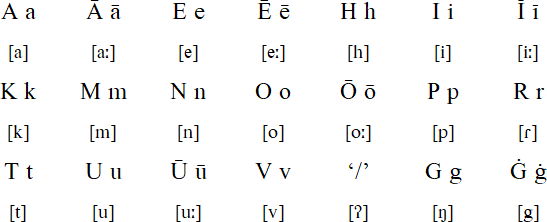Rapa Nui is a member of the eastern branch of Polynesian language family. It is spoken mainly on Easter Island (Rapa Nui) and also in Chile. In 2016 there were about 1,000 speakers of Rapa Nui [source], although other sources give the number of speakers between 800 and 2,700. The majority of speakers are adults, and most children in Easter Island grow up speaking Spanish, and may learn Rapa Nui later in life.
Rapa Nui is also known as Rapanui, Pascuan or Pascuenese. It is morphologically closest to Marquesan, and phonologically closest to Māori. It also contains many words borrowed from Tahitian and Spanish.
Easter Island is known as Rapa Nui in Rapa Nui, and Isla de Pascua in Spanish. It was annexed by Chile on 9 September 1888 and has been run by Chile since then. On 30 July 2007 the island became a special territory of Chile. Until the late 1990s the Rapa Nui people were effectively not permitted to speak their native language, and Spanish was required for public sector jobs. Education was also in Spanish.
Since the early years of the 21st century language policies have changed and there are now classes in Rapa Nui in Easter Islands schools, and some subjects, such as science and history, are taught through Rapa Nui in one school.
A version of the Latin alphabet is used to write Rapa Nui, although the language is rarely written, and most Easter islanders write in Spanish. However in 2010 the first ever newspaper in Rapa Nui was published, and there are plans for a dictionary.
A form or writing or proto-writing known as Rongorongo was used in Easter Island until the 1860s. Knowledge of it was lost however, and it has yet to be successfully deciphered. It is thought that is was used to write Rapa Nui.

Download an alphabet chart for Rapa Nui (Excel)
Te hanau henua, mai te poreko hanga, he manu tere, manu rarama e manu mana’u; ko tu’u piru ana ta’ato’a. Mai ai he hanau e haka topa ro a i te mana’u, e here, e mo’a, e tapu ki a raua ‘a.
All human beings are born free and equal in dignity and rights. They
are endowed with reason and conscience and should act towards one another
in a spirit of brotherhood.
(Article 1 of the Universal Declaration of Human Rights)
Information about Rapa Nui | Phrases | Numbers | Rongorongo script | Books
Informationa about Rapa Nui
http://en.wikipedia.org/wiki/Rapa_Nui_language
http://www.rongorongo.org/vanaga/
http://pri.org/stories/2013-09-04/easter-island-dedicated-few-trying-preserve-native-rapa-nui-language
Rapa Nui dictionary
http://kohaumotu.org/Rongorongo/Dictionary/dictionary_complete.html
Rapa Nui phrases
https://www.easterisland.travel/easter-island-facts-and-info/rapa-nui-language/learn/
http://wikitravel.org/en/Easter_Island_phrasebook
http://www.logos.it/corso_rp/02_lezione.html
http://www.logos.it/corso_rp/04_lezione.html
http://imaginaisladepascua.com/en/easter-islands/rapa-nui-culture/rapa-nui-language/
https://forum.unilang.org/viewtopic.php?t=4272
Information about Easter Island
http://www.rapanui.cl
http://www.netaxs.com/~trance/rapanui.html
Languages written with the Latin alphabet
Page last modified: 26.09.21
[top]
You can support this site by Buying Me A Coffee, and if you like what you see on this page, you can use the buttons below to share it with people you know.

If you like this site and find it useful, you can support it by making a donation via PayPal or Patreon, or by contributing in other ways. Omniglot is how I make my living.
Note: all links on this site to Amazon.com, Amazon.co.uk
and Amazon.fr
are affiliate links. This means I earn a commission if you click on any of them and buy something. So by clicking on these links you can help to support this site.
[top]